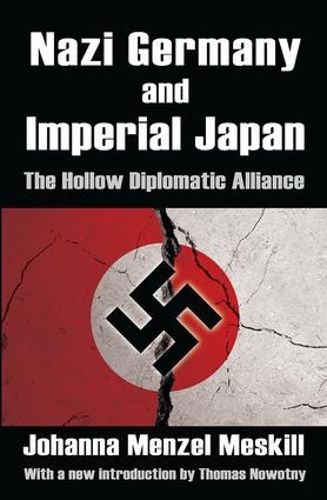Readings Newsletter
Become a Readings Member to make your shopping experience even easier.
Sign in or sign up for free!
You’re not far away from qualifying for FREE standard shipping within Australia
You’ve qualified for FREE standard shipping within Australia
The cart is loading…






Alliances between sovereign states are among the least stable political associations. Despite professions of fidelity and common purpose, most are effective for only short periods, and only as long as it suits their interests. The German-Japanese alliance of World War II was not so much a marriage of convenience as a long and uneasy engagement. It was maintained because breaking the engagement would have reduced the prestige of each nation-state.
Germany and Japan each found the existence and policies of the other convenient. From 1933-1945, both powers challenged the international order; other than this, nothing else united Germany and Japan. Even while they shared some of the same opponents, German and Japanese antagonism toward the Allies involved different objects of contention and questions of timing. Consequently, coordination of German and Japanese policies did not follow.
Johanna Menzel Meskill argues that the German-Japanese alliance failed, not only because each power failed separately to attain its goals, but because as allies the powers failed to take advantage of their association. The failure resulted to a large extent from the discordance between their political goals and the means necessary to attain them. This work in diplomatic history is a careful analysis of presuming identities in a world of diplomatic differences.
In a new introduction to the book, Thomas Nowotny looks back on the alliance from a historical perspective. He concludes that both parties overestimated the potency and effectiveness of their military power. Like many before and some after, they more generally subscribed to the offensive use of military power and effectiveness that the history of the twentieth centery has proven unwarranted.
$9.00 standard shipping within Australia
FREE standard shipping within Australia for orders over $100.00
Express & International shipping calculated at checkout
Alliances between sovereign states are among the least stable political associations. Despite professions of fidelity and common purpose, most are effective for only short periods, and only as long as it suits their interests. The German-Japanese alliance of World War II was not so much a marriage of convenience as a long and uneasy engagement. It was maintained because breaking the engagement would have reduced the prestige of each nation-state.
Germany and Japan each found the existence and policies of the other convenient. From 1933-1945, both powers challenged the international order; other than this, nothing else united Germany and Japan. Even while they shared some of the same opponents, German and Japanese antagonism toward the Allies involved different objects of contention and questions of timing. Consequently, coordination of German and Japanese policies did not follow.
Johanna Menzel Meskill argues that the German-Japanese alliance failed, not only because each power failed separately to attain its goals, but because as allies the powers failed to take advantage of their association. The failure resulted to a large extent from the discordance between their political goals and the means necessary to attain them. This work in diplomatic history is a careful analysis of presuming identities in a world of diplomatic differences.
In a new introduction to the book, Thomas Nowotny looks back on the alliance from a historical perspective. He concludes that both parties overestimated the potency and effectiveness of their military power. Like many before and some after, they more generally subscribed to the offensive use of military power and effectiveness that the history of the twentieth centery has proven unwarranted.